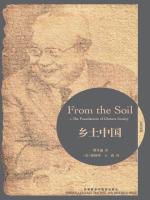乡土中国
Danedl
SOIL THE FOUNDATIONS OF CHINESE SOCIETY "Soil The Foundation of
Chinese Society" is an analysis of China's social structure, in
which rural and soil run through the book directly to the core of
China's traditional small-scale peasant economy, the grass-roots level
of Chinese society is defined as rural. The author, Mr. Fei Xiaotong, is
one of the founders of sociology and anthropology in China. His
representative works include "Academic Narration and
Reflection," "Record of Knowledge from Reality" and so
on. "Soil The Foundation of Chinese Society" is made by Mr.
Fei rooted in the land where people are born and raised, and
comprehensively shows the face of the grassroots society. The beginning
of the Soil The Foundation of Chinese Society for us to point out that
can summarize the book's three key words: "grassroots,"
"society" and "local," we often use
"rustic" to describe the countrymen but forget that our nation
and soil are inseparable. The simple customs and traditional rules of
etiquette make mutual trust a natural part of rural society and bind a
small community together. With the development of society and all kinds
of culture, the text into the countryside has been resisted by the local
society, because the text is redundant in the communication of the local
society, and the culture is passed from mouth to mouth because of the
parent child relationship. Therefore, in the next part: "The Word
Goes to the Countryside" in Mr. Fei not only explains why the local
society does not need words, but also describes it in detail. Mr. Fei
believes that if the words go to the countryside, the basic social
structure of the local society must be changed first. Differential
pattern" Is a very important sociological point of view put forward
by Mr. Fei, he believes that social relations in rural society are
connected by private relationship. Looking at the differences between
East and West, it is found that in the Eastern social rules, private
affairs are more important than public affairs and the judgment of
morality is based on the expansion of private relations; In Western
societies, the group framework forms the constitution that binds
everyone equally through the law. However, the local society is the
"rule by ceremony" society, "rule by ceremony" is a
normative force different from today's "rule by law," the
local society emphasizes education and morality; Modern cities and
western societies establish a legal order to protect individual rights
and social security with emphasis on the clear quantification of
individual rights; The rule of law is contrary to the concept of the
relationship between people in rural society, so it can not effectively
establish the rule of law order. At the same time, in judging right and
wrong, there is a great difference between rule by ceremony and rule of
law. But whether it is the rule of etiquette or the rule of law society
can not be separated from the "power," here Mr. Fei mentioned
inaction politics (layers of power transmission) The "groups"
mentioned here are not the same as the West or modern,the power of the
squeeze makes the ability of the more people are exploited. But what Fei
wants to say is that as society changes, this kind of "elder
rule" has broken through the "seniority order," and
people who can adapt to social laws and output value orientation can
also be called "elders" no matter how young they are. In the
analysis of the power of rural society, "stop the pace of progress
is the beginning of aging," this is what I think this part of Mr.
Fei wants to let the readers know. Mr. Fei extends to the whole rural
society through personal community relations, and then compares the
differences between the Eastern and Western social views, which I think
is also to express the view that scientific and technological progress
has caused social changes. Throughout the history of thousands of years
of Chinese culture, local culture from generation to generation, the
younger generation to listen to the guidance of the elder to solve
problems; However, the culture for 100 years has a strong impact on the
previous culture, and the advice of the ancestors can not solve the
problems of today, and there is no educational significance so there is
a "generation gap." Nevertheless, the local culture has
survived for five thousand years, proving that its state and ability to
maintain its own stability is very strong, which is my view of this
book. In reading this book, I think we can first understand the
postscript written by Mr.Fei, from the understanding of his various
perspectives on society, we can reduce a lot of confusion when reading.
In general, "Rural Society" is a very suitable book for young
people to understand the social structure of the past to the present.
From understanding to understanding the formation of rural society, it
can also give us some suggestions on adapting to the times and dealing
with social relations.



 京公网安备 11010802032529号
京公网安备 11010802032529号